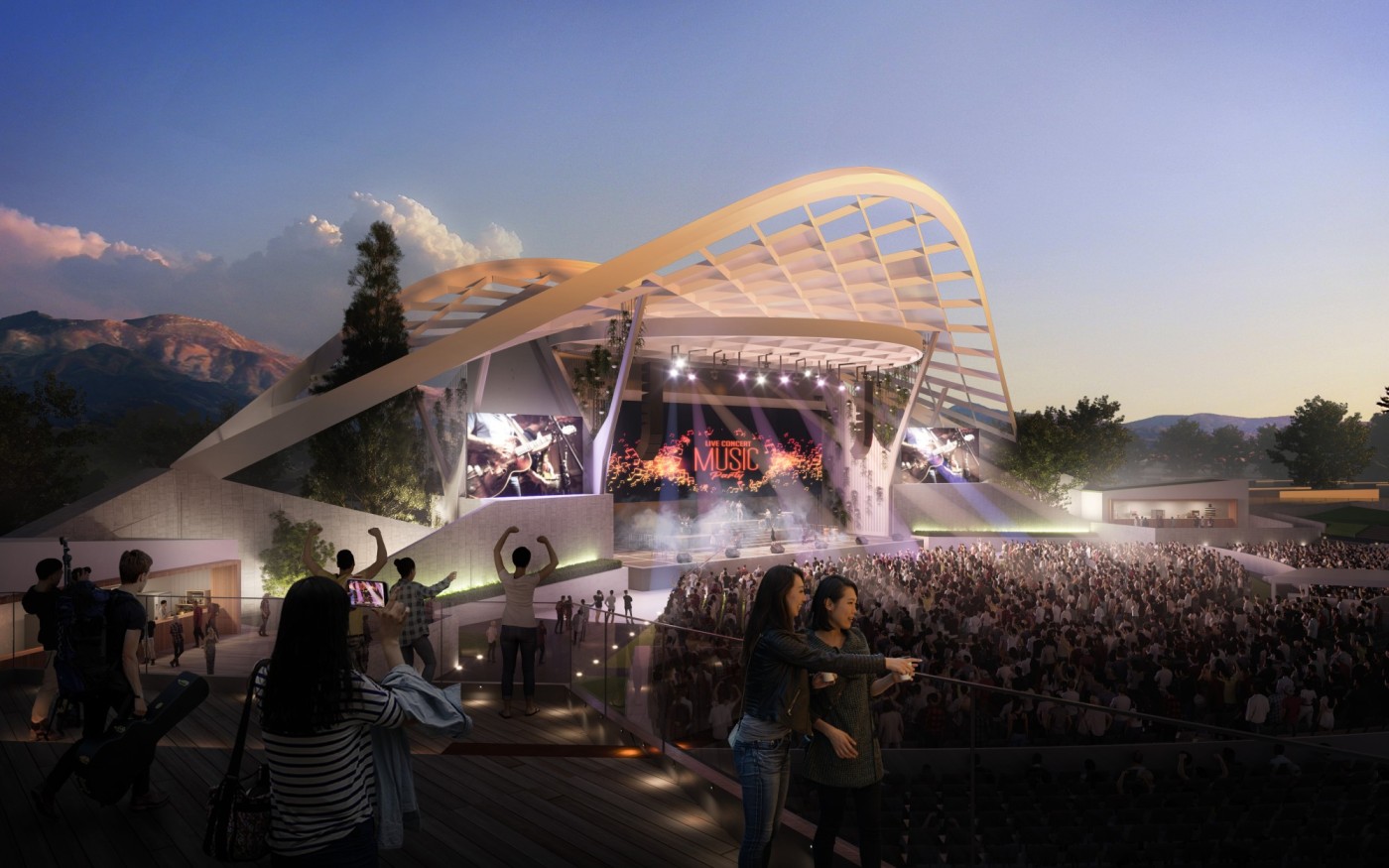Irvine is the latest municipality debating how deep it wants to be in the entertainment business.
The city is currently home to a temporary amphitheater, built on Great Park developer FivePoint’s land, that’s one of the hottest outdoor concert sites in California. But it’s time to make 2017’s interim venue a more permanent place.
So, who would say “no” to replacing a facility that drew 300,000-plus music fans last year?
Well, does that same place have spare tens of millions in tax dollars?
The deal Irvine made last year with giant concert promoter Live Nation to jointly build a 14,000-seat amphitheater on land at the city’s Great Park seems to be dead. The company, worth $18 billion by Wall Street math, would chip in $20 million. The city’s share could run $110 million to $130 million on construction. The partners would share various income streams from the venue.
Yet as the two parties continue to haggle, the city’s staff commissioned a study to look at building a less-ambitious amphitheater. It’d be roughly half the size (6,000 to 8,000 seats) with construction costs of $80 million to $90 million.
Come Valentine’s Day night, the city council will debate what’s next.
Deep pockets
Peek across Southern California and you’ll see it helps to have really deep pockets behind any entertainment project.
Several recent arenas were built with little or no taxpayer cash.
In Inglewood, billionaire football owner Stan Kroenke spent roughly $5 billion to build the landmark 70,000-seat Sofi Stadium for his National Football League Rams and its No. 1 tenant – the Los Angeles Chargers.
Across the street from SoFi, billionaire basketball owner Steve Balmer is building the $2-billion, 18,000-seat Intuit Dome for his Los Angeles Clippers to open in the summer of 2024.
In the Coachella Valley, entertainment investors Oak Valley Group and partners – including Live Nation, wink! – just spent $300 million to build Acrisure Arena in the desert. The 11,000-seat indoor arena is home to a minor-league hockey team and will host numerous concerts.
And in Anaheim, the billionaire Samueli family plans to spend $4 billion to turn parking lots and underutilized land around the city’s Honda Center indoor arena into an entertainment and commercial real estate complex known as OCVibe.
But just across the 55 freeway, Anaheim didn’t have the same luck trying to sell the parking lot around the city’s baseball stadium for similar festive, multi-use purposes.
The city’s deal with the Angels’ owner, billionaire Arte Moreno, ran into a wave of economic, logistical and then legal woes – including political corruption accusations that killed the deal.
Good bet?
Irvine city documents suggest the outdoor concert business isn’t very profitable for anyone other than the entertainers on stage.
Musical talent takes roughly three-quarters of the ticket revenue. There are myriad other expenses involved with such a production, so only modest profits remain.
Plus, entertainers in recent years have demanded higher ticket prices – averaging roughly $70 at the Irvine facility in 2022. Those soaring costs hiked the revenue stream, which averaged nearly $700,000 for the 33 shows held at the temporary facility last year.
But the city’s study says pricey admission is limiting attendance and thinning profit margins.
Now Irvine could lower its investment with the cheaper, smaller amphitheater. But that in turn creates numerous challenges – including doing it without Live Nation.
There is more competition for acts and fans with the likes of the Greek Theater in Los Angeles to Costa Mesa’s Pacific Amphitheatre. Plus, a small indoor theatre will be built at Anaheim’s OCVibe.
Fewer seats also may mean many high-profile acts won’t come. Yet city research says promoters who were interviewed suggest other entertainers will still want a piece of Orange County‘s hefty entertainment spending.
However, risk-reward isn’t the kind of juggling politicians do well.
Bulldozed
Look, I enjoy an occasional night of music under the stars. In 2016, I saw Gwen Stefani headline the last show at the old Irvine Meadows amphitheater across the 405 from the Great Park site.
Related Articles
AMC will start charging more for the seats most desired by moviegoers
Oscar nominations show both progress and regression for diversity
Regal to close 39 more theaters, including 11 in California
My musical fancy aside, cities shouldn’t directly be in the entertainment business – owning or operating facilities for music or professional athletics.
Politely stated, the private sector knows better. Remember, land giant Irvine Co. bulldozed the Irvine Meadows to make way for housing. And then consider Live Nation’s skimpy offer to help build a new music venue in Irvine.
Yet cities are stuck in the entertainment business by being a destination – for homes, jobs, commerce and fun. Plus, Irvine wouldn’t just be betting on the venue’s simple cash flow.
City leaders are no doubt eyeing a bigger picture, too: Concertgoers come to town and buy food and souvenirs. That spending generates local sales-tax dollars.
Try to think of an amphitheater or stadium as a factory of entertainment. Would any municipality spend millions building a production facility for any other industry?
Probably not, because there’s far more civic sizzle from a place generating fun than, say, a city-owned mill, mall, warehouse or office park.
Jonathan Lansner is the business columnist for the Southern California News Group. He can be reached at jlansner@scng.com





